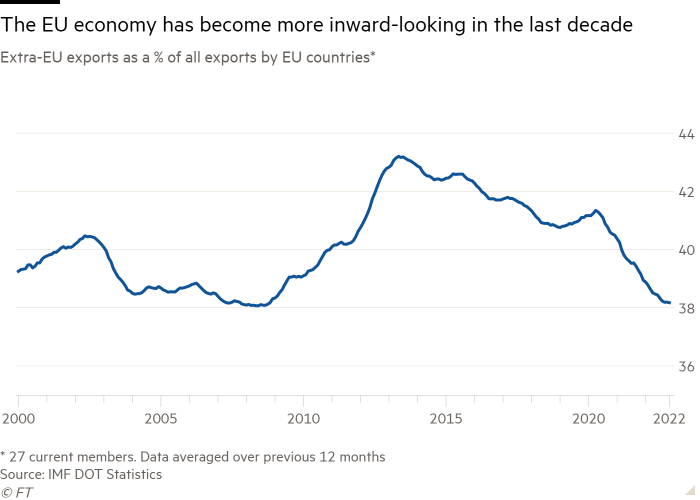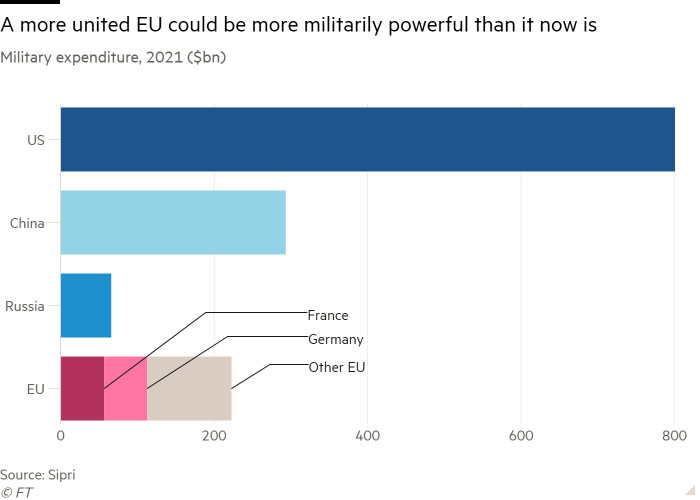The EU’s future in a world of deep disorder


“The Law of Nations Shall be Founded on a Federation of Free States.” Thus did the great German philosopher Immanuel Kant lay down the foundations of his plan for a “perpetual peace”. No part of the world has embraced his idealism more completely than post-second world war Europe. Yet is this great dream now dead?
The British diplomat Robert Cooper argued brilliantly that we can divide the world into the “pre-modern”, by which he meant the parts where anarchy reigns, the “modern”, by which he meant the world of nation “states”, and the “post-modern”, by which he meant Europe’s effort to create a federation of states, as Kant had called for. Cooper argues that “what came to an end in 1989 was not just the cold war or even, in a formal sense, the second world war . . . What came to an end in Europe (but perhaps only in Europe) were the political systems of three centuries: the balance of power and the imperial urge.”
Nobody acquainted with the history of Europe should be in the least surprised by the desire for a different way for states to behave and relate to one another. Indeed, one would have to be an imbecile not to understand it.
Yet how does this idealistic EU adjust to our new world, in which the imperial urge is horrifyingly visible on its frontiers? How does it adjust to a world no longer characterised by anything that could plausibly be called a “rules-based international order”, but rather one of economic crises, pandemics, deglobalisation and great power conflict?

Theoretically, perhaps, the “post-modern” EU might survive in this new world, with its frightening impulses towards destruction. But the post-1989 dream of a very different world order made it far easier for the EU to be the prosperous and pacific continent it wanted to be. The US exploited the “unipolar moment” by throwing its military weight around the world. That was not what Europe wanted, as its reaction to the war in Iraq demonstrated.
Some of the problems the EU faces derive from the fact that it is a confederation of states, not a state. The difficulties of managing divergent economies within a monetary union are an inevitable result. The European Central Bank plays an essentially political role in keeping the economies together. Again, the single market is not integrated in the way the US market is. The lack of dynamism in information and communications technology must be partly explained by this reality: after all, only one European company, ASML, a producer of chipmaking equipment, is among the 10 most valuable technology firms in the world. (See charts.)

Such difficulties are only likely to grow in this more nationalist and more fragmented world economy. The open world markets on which Germany, in particular, depended are becoming less so. That is bound to be costly. Moreover, the US is moving towards an interventionist and protectionist industrial policy. For the EU, such a shift creates existential problems. Similar efforts there are bound to be more national than European. This would threaten the single market and give the whip hand to the member countries with the most resources. Germany will be the best positioned. At the same time, the higher costs of energy in Europe than in the US are a threat to its own heavy industry.

Meanwhile, there have emerged two huge threats to EU security. One is the confrontation with Russia, which, many fear, might soon be backed militarily by China. This, however, is just one aspect of splitting the world into rival blocs, with incalculable longer-term consequences for everybody, but especially for the bloc that wants peace above all. The other threat is from the global environment. While the EU has been in the lead on climate policy, this is a problem it cannot solve on its own, since it produces only 9 per cent of global emissions and is responsible for none of their growth.
So, how might the EU, liberated from the internal obstacles created by a sovereignty-obsessed UK, respond to a global environment so different from the one it hoped for some three decades ago?

Globally, it needs to decide whether it wishes to be an ally, a bridge or a power. So long as the US remains a liberal democracy and committed to the western alliance, the EU is bound to be closer to it than to other great powers. In this world, then, that makes it most likely to be a subservient ally. A role as a bridge would come naturally to an entity committed to the ideal of a rules-governed order. The question, though, is how to be a bridge in a deeply divided world in which the EU is far closer to one side than the other. The third alternative is to seek to become a power of the old kind in its own right, with resources devoted to foreign and security policy commensurate with its scale. But for this to happen the EU would need a far deeper political and also fiscal union. The obstacles to that are legion, including deep mutual distrust.

Internal reforms must depend in substantial part on what role the EU wishes to play in this new world. The more active and independent it wishes to be, the more crucial it will be to deepen its federalism. Such a deepening would be risky, no doubt, since it will awaken nationalist reactions. It may also be impossible to agree. But a degree of deepening may be inescapable, given the need for a more robust security posture and the fragility visible in divergence across the eurozone.
The Kantian dream has not proved exportable. We live in a world characterised by disorder, nationalism and great power conflict. This is not the world of which the EU dreamed. But if its leaders wish to preserve their great experiment in peaceful relations, they need to strengthen it for the storms.
Comments